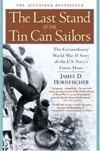Technical information
| Type | Destroyer |
| Displacement | 1690 BRT |
| Length | 109 metres |
| Complement | 183 men |
| Armament | 6 4.7" guns (3x2). 1 4" AA gun. 4 2pdr AA (1x4). 5 21" torpedo tubes (1x5). |
| Max speed | 36 knots |
| Engines | Geared turbines, 2 shafts |
| Power | 40000 SHP |
| Notes on class | The J, K and N Class ships were developed as a result of the Admiralty under pressure to cut costs but requiring more new and powerful destroyers. The cost of further Tribal Class ships was attractive but could not be justified on cost grounds. The Staff requirement also required a return to a heavy torpedo outfit. While some see these ships as cut down versions of the Tribal Class they were the first to see the introduction on Longitudinal Frames and other weight saving methods of construction. Several ships owed this method of construction to their survival, HMS Javelin was mined and reduced to less than half her original length, but she was towed in and repaired. Many of the J and K Classes served and were lost in the Mediterranean they participated in many successful engagement, accounting for Italian cruisers, destroyers and many merchant ships. |
 Royal Navy ships of the N class
Royal Navy ships of the N class
To see all N class ships click here.
| HMS Nepal (G 25) (To Australia as HMAS Nepal) | ||
| HMS Nerissa (G 65) (Became the Polish destroyer Piorun) | ||
| HMS Nestor (G 02) (To Australia as HMAS Nestor) | ||
| HMS Nizam (G 38) (To Australia as HMAS Nizam) | ||
| HMS Noble (G 84) (Became the Dutch destroyer Van Galen) | ||
| HMS Nonpareil (i) (G 16) (Became the Dutch destroyer Tjerk Hiddes) | ||
| HMS Norman (G 49) (To Australia as HMAS Norman) | ||
Flotilla leader | ||
| HMS Napier (G 97) (To Australia as HMAS Napier) | ||
Full wartime service history on this vessel. | ||
See all Royal Navy Destroyer classes.
 The last stand of the tin can sailors Hornfischer, James D. |
Books dealing with this subject include:
|
